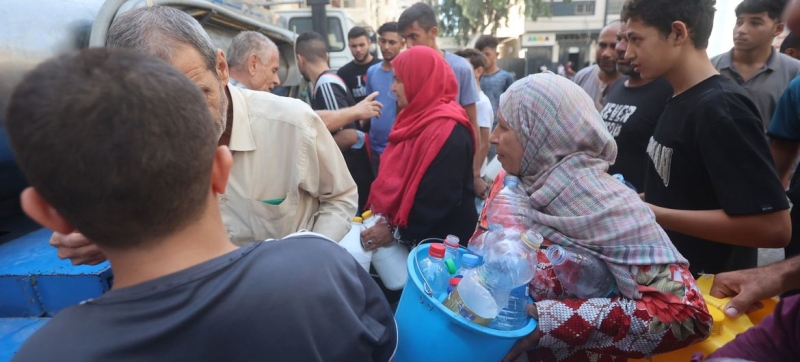
“Critical supplies, including water canisters, are not reaching people in need at the scale they need.” Gaza: ‘Humanitarian Zone’ areas now frontline Peace & Security
The Israeli military’s “continuous” evacuation orders from various areas of Gaza threaten to forcefully displace already extremely vulnerable people in the enclave. Vital services in the Strip could soon be cut off entirely, UN aid workers warned on Wednesday.
More than 10 months after the Gaza war erupted following Hamas’s terrorist attack on southern Israel, virtually all of the Strip’s residents have been displaced at least once by repeated evacuation orders and intense Israeli bombing.
“Nowhere in the Gaza Strip is safe right now… It feels like people are just waiting to die,” Louise Wateredge, a spokesperson for the United Nations Refugee Agency (UNRWA), told the X website. “The areas that were in the so-called humanitarian zone are now the front lines.”
Key route blocked
In its latest report on the situation in Gaza, the UN Office for the Coordination of Humanitarian Affairs (OCHA) said ongoing fighting and repeated evacuation orders in Gaza were hampering aid missions already hampered by access restrictions, fuel shortages and other problems.
OCHA said part of the Salah ad-Din road, a vital route for humanitarian aid from south to north, was affected by an evacuation order issued by Israeli authorities on Saturday for the town of Deir el-Balah. “The order made it virtually impossible for humanitarian workers to move along this key route,” the OCHA report said.
Another coastal road in Gaza is no longer a “viable alternative” for delivering humanitarian aid, the agency said, as the beaches along the route are overcrowded with makeshift shelters built by Palestinians forcibly displaced from their homes.
“As a result, convoys along the coastal road are moving extremely slowly and critical supplies, including water canisters, are not reaching people in need at the scale they need,” OCHA warned.
Tanks in Khan Younis
Speaking of Khan Younis, where Israeli tanks have returned, UNRWA expressed concern that key infrastructure in areas of the city where evacuations are taking place could soon be damaged or destroyed. These include a newly renovated water pumping station that serves about 100,000 people, the UNRWA Japan Medical Centre, which reopened last month and is set to play a key role in the upcoming polio vaccination campaign, and a large training centre that is currently being used as a warehouse for humanitarian supplies.
“We have water, we have medicines and vaccines and we have distribution; if any of those facilities are damaged or destroyed, it will be a disaster,” Louise Wateridge told UN News Service.
